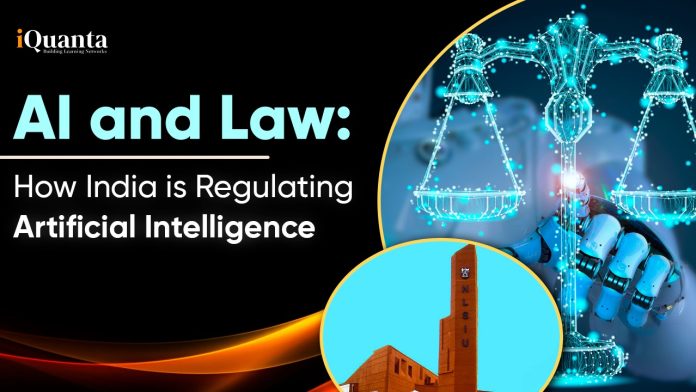Artificial Intelligence is rapidly shaping the face of the world we are living in. Artificial Intelligence has now woven the fabric of our daily lives. India is a leading country with cultural diversity, economic disparity, and rapid digital transformations, which bring unprecedented opportunities and serious challenges to its citizens. India is one of the largest pools of internet users and is positioned uniquely to benefit from AI-led growth. However, this rapid development also poses serious threats for the citizens. This blog is specially curated to analyse how India is approaching the regulations of artificial intelligence. We’ll explore the existing government laws and initiatives towards the proposed frameworks and ethical concerns. Dive into the relationship between artificial intelligence and the law in India.

Regulation towards Artificial Intelligence
Artificial Intelligence has the potential to influence productivity, optimize governance and solve the challenges related to healthcare, education, agriculture and much more. However, without proper surveillance, it can infringe privacy and even threaten the national security of the citizens. India stands at a crucial point with the need for proactive regulation of AI to encourage innovation without any harm to the citizens. Mentioned below are some key concerns related towards the regulation of artificial intelligence:
- Misuse of data and violation of privacy by AI
- Discrimination and biased algorithm
- Displacement of jobs and economic disparity
- Threats towards cybersecurity and misinformation
Government Initiatives towards shaping Artificial Intelligence
The government must ensure that the development of artificial intelligence in India remains ethical and future-ready at the same time. Keeping in view this concern, the government has launched multiple initiatives concerning the policy institutions to build infrastructure, support innovation and establish regulatory norms for artificial intelligence. Check out below for the list of some initiatives taken by the government along with their objectives:
| Body | Year of Launch | Key Focus | Organization |
| National Strategy for AI – “AI for All” | 2018 | The key focus was to regulate sectors such as Healthcare, Agriculture, Education, Smart Cities, etc. | NITI Aayog |
| Responsible AI: Working Document | 2021 | Introduce ethical AI Principles like fairness, transparency and privacy. | NITI Aayog |
| SUPACE (AI Tool for judiciary) | 2021 | Introduce AI-assisted judicial efficiency. | Supreme Court of India |
| INDIAai Portal | 2020 | A platform for AI-related news and research purposes. | MeitY, NASSCOM, and NeGD |
| IndiaAI Program | 2023 | R&D Funding, startup ecosystem, governance and skill development. | Ministry of Electronics & IT (MeitY) |

Challenges in Regulating Artificial Intelligence
The potential of artificial intelligence is so vast that it poses complexities in its regulation. Enforcing a comprehensive legal framework for India is a technical challenge for the government. The regulations must cover the legal, infrastructural, and socio-economic concerns in the Indian context. Let’s explore below the threats and challenges towards regulating artificial intelligence:
Absence of Unified Framework
The most immediate challenge towards regulation of Artificial Intelligence is the absence of a central legislation. The existing laws such as the IT Act, 2000, Consumer Protection Act 2019 were not designed keeping in view the modern-machine learning systems and often fails when it comes to dealing with AI-driven decision-making.
Lack of skilled workforce
India still lacks AI-specific skills such as deep learning, AI ethics and regulatory tech. This develops a talent gap not just for developers but also for policymakers, law enforcing bodies and judiciary. This poses a significant challenge while ensuring equitable access to AI benefits. Regulatory bodies must ensure that AI Laws are not amplifying the socio-economic disparities instead of reducing them.
Rapid Technological Evolution
Artificial Intelligence is a continuously evolving sector where new models, such as generative AI which are pushing the boundaries of the capabilities of a machine. Therefore, it is necessary to draft legislation that is relevant in such a rapidly evolving environment. Policymakers must ensure flexibility so that it can adapt to future advancements without being restrictive.

Balancing Innovation with Regulation
Another important hurdle is to maintain a balance between innovation and enforcing regulation. The legislature must design a regulatory model that provides clarity and safety without being a restriction to research and entrepreneurship. This balance is extremely important to allow India to become a global hub for ethical and inclusive AI development.
Public Awareness
Lastly, public awareness towards understanding artificial intelligence is also equally important for its regulation. Many users neglect the fact of how their data is being used or what their rights are in case of any misuse. This can heavily affect the large-scale adoption of AI-based public services. Therefore, public awareness must go hand in hand with effective regulation of artificial intelligence.
Proposed AI Legislation and Emerging Regulatory Trends
Currently, there is an ongoing discussion on introducing AI-specific regulation, but till now, no official bill has been passed. Given below are some policy suggestions that must be introduced:
- Many experts have suggested that a separate independent authority, such as an AI Ethics Commission, must be set up to monitor the development of AI and handle the grievances.
- Due to the EU’s AI Act, the Indian Policymakers are deciding to categorise the AI applications as Low risk, High-risk and unacceptable risk.
- All future regulations must mandate that the AI systems are explainable as well as auditable. Companies will need to reveal how their algorithms make decisions.

FAQs
No, currently, India does not have any dedicated law towards Artificial Intelligence, but the government is working towards forming policy frameworks and accordingly regulating AI Development and usage.
IndiaAI is a national program started with the purpose of building a comprehensive AI ecosystem across India by MeitY to improvise innovation and research.
Artificial Intelligence is currently being monitored using existing laws such as the IT Act, Consumer Act and Digital Personal Data Protection Act.
The Supreme Court has introduced SUPACE, which is an AI tool to encourage legal research and improvise case efficiency.
The key ethical concerns with AI in India include algorithmic bias, misused surveillance systems and privacy breaches leading to a lack of transparency in decision-making.




